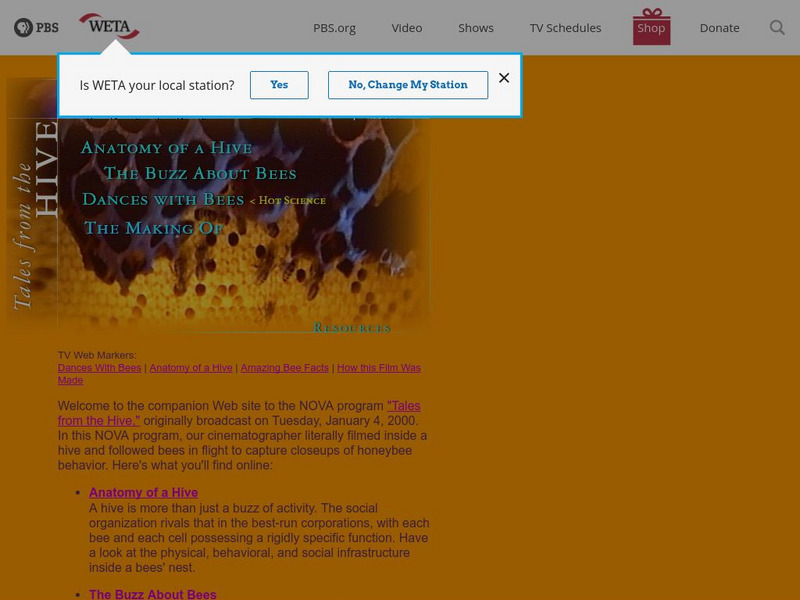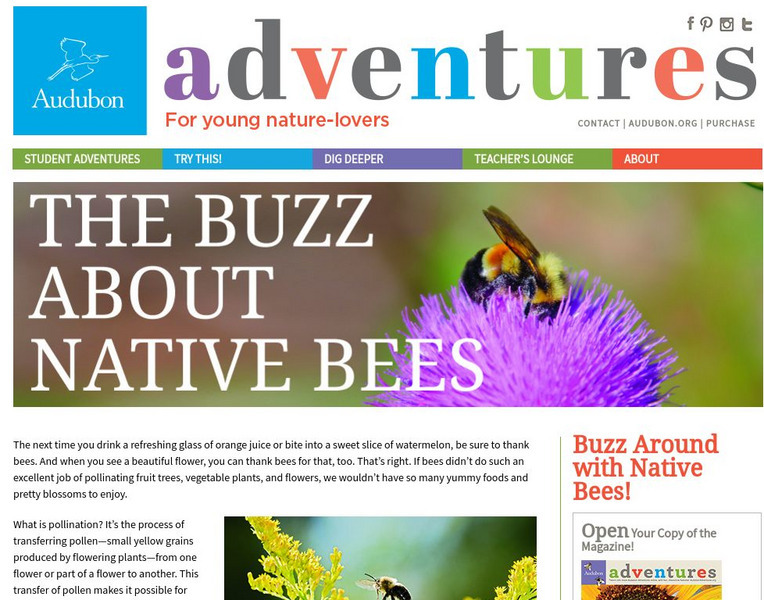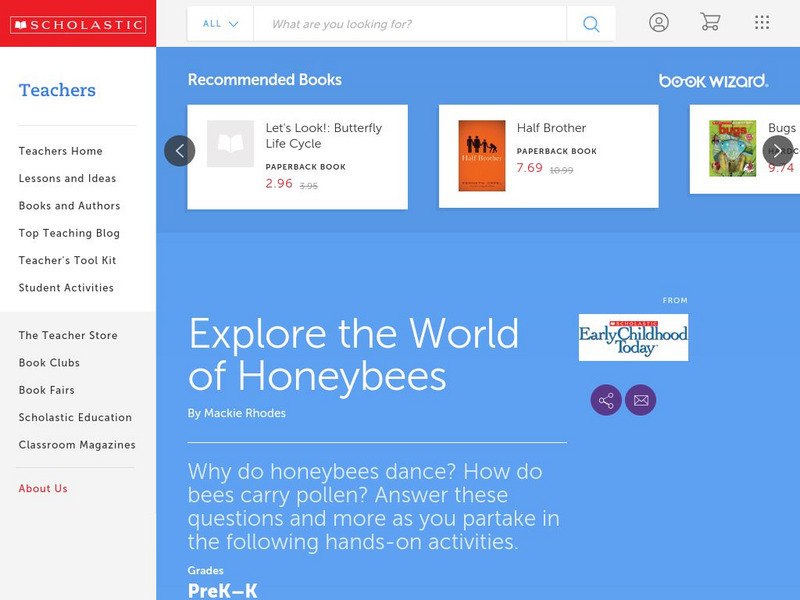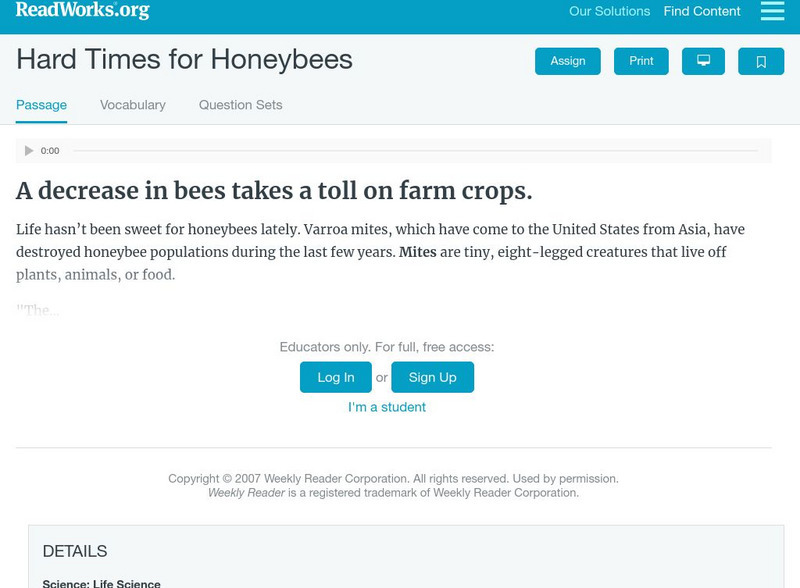Nature Conservancy
The Nature Conservancy: Discover the Culprit Behind Declining Bee Populations
Bees provide vital benefits to people, including crop pollination and products such as honey and beeswax. But we're losing bees through colony collapse disorder. In this lesson, students are put at the cutting edge of research on...
Treehut
Suzy's World: Bees
Use this site to find out why bees make honey with this quick fact sheet on bees.
Curated OER
Wikipedia: National Historic Landmarks in Pennsylvania: Honey Hollow Watershed
An image of the Honey Hollow Watershed.
PBS
Pbs Nova: Tales From the Hive
Website that accompanies the NOVA program "Tales from the Hive." Site includes additional facts on bees, specifically the breakdown of a bee hive, and the different dances bees do as well as what they mean.
National Audubon Society
National Audubon Society: Audubon Adventures: The Buzz About Native Bees
Resources for learning about the important role bees play in pollinating plants, especially those we eat. Includes a student magazine full of information about bees, an interactive pollination chart, and a quiz.
Discovery Education
Discovery Education: Pollination Parties
This instructional activity helps students understand the concept of pollination. Objectives, materials, procedures, adaptations, discussion questions, evaluation, extensions, suggested readings, links, vocabulary, and academic standards...
Writing Fix
Writing Fix: An I Pod Inspired Poetry Lesson: Things I Love Poems and Songs
This lesson and prompt encourages students to show information about themselves as they set the things that they love to the music of Tom T. Hall's, "I Love." Students will be further inspired after hearing Brigitte Minne's book, I Love,...
Other
Gems in Israel: The Biblical Seven Species
Use this site to learn about how Israel's Seven Species, wheat, barley, vines, figs, pomegranates, olive oil and honey play an important role in Israel's land, culture, and cuisine.
Illustrative Mathematics
Illustrative Mathematics: G Mg Hexagonal Pattern of Beehives
Beehives are made of walls, each of the same size, enclosing small hexagonal cells where honey and pollen are stored and bees are raised. This problem examines some of the mathematical advantages of the hexagonal tiling in a beehive....
Extreme Science
Extreme Science: Largest Living Organism Fungus
Armillaria, also known as the 'honey' mushroom, is the world's largest fungus. It has been found to have killed whole groves of trees by spreading its rhizomorphs underground over thousands of acres of land. More about this fascinating...
Countries and Their Cultures
Countries and Their Cultures: Okiek
"Okiek" is the name of a Kenyan people who formerly lived by hunting game, making beehives, and gathering and trading honey; it is also the name of their language. The collective name "Okiek" includes over two dozen local groups, each...
The BIG zoo
The Big Zoo: Honey Bee
Site provides some fascinating facts regarding these extremely important insects. Contains a physical; description, information regarding their diet, habitat, social structure, birth and offspring as well as senses.
National Pest Managment Association
Pest World for Kids: Bees
Comprehensive guide for learning important facts about bees such as their habitat, diet, and impact. Content includes details on bumble bees, carpenter bees, honey bees, and killer bees.
Council for Economic Education
Econ Ed Link: No Funny Money, Honey I Want the Real Thing!
Do you know what funny money is? It's NOT the real thing! Find out how our government tries to make our money hard to copy in this lesson about real and fake money.
Scholastic
Scholastic Instructor: Explore the World of Honeybees
Discover more about bees through this educational resource. This resource features math and science activities, experiments, fun facts, and more.
Read Works
Read Works: Hard Times for Honeybees
[Free Registration/Login Required] An informational text that asks the reader to make predictions about problems created by the decreasing bee population. A question sheet is available to help students build skills in reading comprehension.
Curated OER
Web Gallery of Art: Cupid the Honey Thief
An image of "Cupid the Honey Thief", created by Albrecht Durer in 1514 (Pen and ink and watercolour on paper, 22 x 31 cm).
Other popular searches
- Honey Bees
- Honeycomb
- Honey Bee Anatomy
- Honeybees
- Africanized Honey Bees
- Honey I Love
- Math and Honey Bees
- Bees Honeycomb
- Honeybee Life Cycle
- Science Honey Bees
- Americanized Honey Bees
- European Honey Bees













